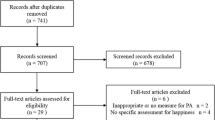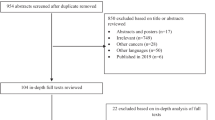Abstract
Introduction
Breast cancer patients undergoing adjuvant chemotherapy often develop fatigue from their treatment that may persist for months. While the positive effects of physical activity in cancer patients are increasingly recognized, the impact of obesity on chemotherapy-induced fatigue has not been well studied.
Methods
Female age 35–75 years with stage I-III breast cancer receiving adjuvant chemotherapy were enrolled in an IRB-approved study. Patient fatigue was self-reported using a 14-question fatigue symptom inventory. Patients were queried about fatigue and their level of exercise before, during, and after completion of chemotherapy. BMI was measured prior to their first cycle of chemotherapy.
Results
Of the 47 evaluable patients, 37 reported performing exercise on a regular basis. Following chemotherapy, 53 % of the exercise group and 80 % of the non-exercise group displayed a worsening of their FS. In patients with a BMI < 25, the fatigue score (FS) after chemotherapy was 27.6 in the exercise group versus 40.5 in the non-exercise group. In patients with a BMI > 25, the FS after chemotherapy was 25.96 in the exercise group versus 32.6 in the non-exercise group.
Conclusion
Our study indicates a trend towards fatigue reduction with exercise even in patients who are overweight. Thus, an elevated BMI at diagnosis does not preclude a breast cancer patient from experiencing the same positive effects from exercise on chemotherapy-related fatigue as patients with normal BMIs. This indicates an important role of physicians in the primary care setting to encourage patients to initiate physical activity when offering cancer-screening services.


Similar content being viewed by others
References
National Comprehensive Cancer Network Guidelines. Cancer-related fatigue. Version 1.2013. 2013
Bower J (2008) Behavioral symptoms in breast cancer patients and survivors: fatigue, insomnia, depression and cognitive disturbance. J Clin Oncol 26(5):768–777
Ferrer R, Huedo-Medina T, Johnson B, Ryan S, Pescatello L (2011) Exercise interventions for cancer survivors: a meta-analysis of quality of life outcomes. Ann Behav Med 41:32–47
Ligibel J (2011) Role of adjuvant and posttreatment exercise programs in breast health. J Natl Compr Cancer Netw 9:251–256
Conn V, Hafdahl A, Porock D, McDaniel R, Nielsen P (2006) A meta-analysis of exercise interventions. Support Care Cancer 14:699–712
Bhaskaran K, Douglas I, Forbes H, Santos-Silvas I, Leon D, Smeeth L (2014) Body-mass index and risk of 22 specific cancers: a population-based cohort study of 5.24 million UK adults. Lancet 384:755–765
Gerber L, Stout N, McGarvey C, Soballe P, Shieh C, Diao G, Springer B, Pfalzer L (2011) Factors predicting clinically significant fatigue in women following treatment for primary breast cancer. Support Care Cancer 19:1581–1591
Fang P, Tan K, Troxel A, Rengen R, Freedman G, Lin L (2013) High body mass index is associated with worse quality of life in breast cancer patients receiving radiotherapy. Breast Cancer Res Treat 141:125–133
Jacobsen PB (2004) Assessment of fatigue in cancer patients. J Natl Cancer Inst Monogr 32:93–97
NIH. National Heart, Lung, and Blood Institute (2015) Calculate your body mass index. http://www.nhlbi.nih.gov/health/educational/lose_wt/BMI/bmicalc.htm
Minton O, Berger A, Barsevick A, Cramp F, Goedendrop M, Mitchell S, Stone P (2013) Cancer-related fatigue and its impact on functioning. Cancer 119:2124–2130
Eyigor S, Kanyilmaz S (2014) Exercise in patients coping with breast cancer: an overview. World J Clinic Oncol 5(3):406–411. doi:10.5306/wjco.v5.i3.406
Mock V, Frangakis C, Davidson N, Ropka M, Pickett M, Poniatowski B, Stewart K, Cameron L, Zawacki K, Podwils L, Cohen G, McCorkle R (2005) Exercise manages fatigue during breast cancer treatment: a randomized controlled trial. Psycho-Oncology 14:464–477
Lu Y, John E, Sullivan-Halley J, VIgen C, Gomez S, Kwan M, Caan B, Le V, Roh J, Marco S, Keegan T, Kurian A, Monroe K, Cheng I, Sposto R, Wu A, Bernstein L (2015) History of recreational physical activity and survival after breast cancer. Am J Epidemiol 181(12):944–955
Author information
Authors and Affiliations
Corresponding authors
Ethics declarations
Conflict of interest
The authors declare that they have no conflict of interest.
Rights and permissions
About this article
Cite this article
Herath, K., Peswani, N. & Chitambar, C.R. Impact of obesity and exercise on chemotherapy-related fatigue. Support Care Cancer 24, 4257–4262 (2016). https://doi.org/10.1007/s00520-016-3257-4
Received:
Accepted:
Published:
Issue Date:
DOI: https://doi.org/10.1007/s00520-016-3257-4




